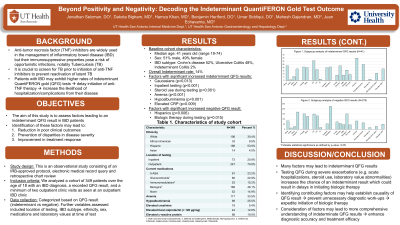Monday Poster Session
Category: IBD
P2184 - Beyond Positivity and Negativity: Decoding the Indeterminate Quantiferon Gold Test Outcome
Monday, October 23, 2023
10:30 AM - 4:15 PM PT
Location: Exhibit Hall

Has Audio
- JS
Jonathan Selzman, DO
University of Texas Health Science Center at San Antonio
San Antonio, TX
Presenting Author(s)
Jonathan Selzman, DO1, Dakota Bigham, MD2, Hamza Khan, MD3, Benjamin Heriford, DO1, Umar Siddiqui, DO2, Mahesh Gajendran, MD, MPH1, Juan Echavarria, MD1
1University of Texas Health Science Center at San Antonio, San Antonio, TX; 2University of Texas Health Science Center-San Antonio, San Antonio, TX; 3UT Health San Antonio, San Antonio, TX
Introduction: Anti-Tumor necrosis factor (TNF) inhibitors are widely used in the management of Inflammatory Bowel Disease (IBD), but their immunosuppressive properties pose a risk of opportunistic infections, notably tuberculosis (TB). To mitigate this risk, it is crucial to screen for TB before initiating anti-TNF therapy to prevent the reactivation of latent TB.
Screening methods for TB include tuberculin skin testing (TST) and QuantiFERON gold (QFG) testing. While TST is more cost-effective, QFGs are more sensitive and accurate. Patients with IBD may exhibit higher rates of indeterminate QFG results, delaying the start of anti-TNF therapy and increasing the likelihood of hospitalization. This study aims to assess factors leading to indeterminant QFG results; identifying these factors may help prevent disparities in disease severity, improve treatment response, and reduce poor clinical outcomes.
Methods: This is a retrospective observational study of IBD patients seen at an outpatient IBD clinic at a large tertiary academic center between the years of 2019 and 2022. Primary inclusion criteria included patients aged over 18 with an IBD diagnosis, a recorded QFG result, and a minimum of two outpatient clinic visits. Patients were categorized based on QFG results (Indeterminate vs. Negative). We performed a multivariant logistical regression analysis to analyze factors that determine the predictors for indeterminate QFG.
Results: A total of 349 patients were included in this study (49% female, median age 41 years). Among the analyzed patients, 181 (52%) had Crohn's disease, while 168 (48%) had Ulcerative Colitis. Overall indeterminate rates within this population were 14%. Significant positive correlations were observed between patients on steroid therapy, abnormal hemoglobin, albumin, and C-reactive protein values, and Caucasians. Conversely, a negative correlation was found between patients on active biologic therapy and those of Hispanic ethnicity.
Discussion: Various factors may contribute to an indeterminant QFG result. Although indeterminate results may prompt further diagnostic evaluation, the identification of contributing factors may help establish the causality of these results and potentially streamline the diagnostic workup process, thus expediting the initiation of biologic therapy. Consideration of these factors may lead to a more comprehensive understanding of indeterminate QFG results, ultimately enhancing diagnostic accuracy and treatment effectiveness.
Disclosures:
Jonathan Selzman, DO1, Dakota Bigham, MD2, Hamza Khan, MD3, Benjamin Heriford, DO1, Umar Siddiqui, DO2, Mahesh Gajendran, MD, MPH1, Juan Echavarria, MD1. P2184 - Beyond Positivity and Negativity: Decoding the Indeterminate Quantiferon Gold Test Outcome, ACG 2023 Annual Scientific Meeting Abstracts. Vancouver, BC, Canada: American College of Gastroenterology.
1University of Texas Health Science Center at San Antonio, San Antonio, TX; 2University of Texas Health Science Center-San Antonio, San Antonio, TX; 3UT Health San Antonio, San Antonio, TX
Introduction: Anti-Tumor necrosis factor (TNF) inhibitors are widely used in the management of Inflammatory Bowel Disease (IBD), but their immunosuppressive properties pose a risk of opportunistic infections, notably tuberculosis (TB). To mitigate this risk, it is crucial to screen for TB before initiating anti-TNF therapy to prevent the reactivation of latent TB.
Screening methods for TB include tuberculin skin testing (TST) and QuantiFERON gold (QFG) testing. While TST is more cost-effective, QFGs are more sensitive and accurate. Patients with IBD may exhibit higher rates of indeterminate QFG results, delaying the start of anti-TNF therapy and increasing the likelihood of hospitalization. This study aims to assess factors leading to indeterminant QFG results; identifying these factors may help prevent disparities in disease severity, improve treatment response, and reduce poor clinical outcomes.
Methods: This is a retrospective observational study of IBD patients seen at an outpatient IBD clinic at a large tertiary academic center between the years of 2019 and 2022. Primary inclusion criteria included patients aged over 18 with an IBD diagnosis, a recorded QFG result, and a minimum of two outpatient clinic visits. Patients were categorized based on QFG results (Indeterminate vs. Negative). We performed a multivariant logistical regression analysis to analyze factors that determine the predictors for indeterminate QFG.
Results: A total of 349 patients were included in this study (49% female, median age 41 years). Among the analyzed patients, 181 (52%) had Crohn's disease, while 168 (48%) had Ulcerative Colitis. Overall indeterminate rates within this population were 14%. Significant positive correlations were observed between patients on steroid therapy, abnormal hemoglobin, albumin, and C-reactive protein values, and Caucasians. Conversely, a negative correlation was found between patients on active biologic therapy and those of Hispanic ethnicity.
Discussion: Various factors may contribute to an indeterminant QFG result. Although indeterminate results may prompt further diagnostic evaluation, the identification of contributing factors may help establish the causality of these results and potentially streamline the diagnostic workup process, thus expediting the initiation of biologic therapy. Consideration of these factors may lead to a more comprehensive understanding of indeterminate QFG results, ultimately enhancing diagnostic accuracy and treatment effectiveness.
Disclosures:
Jonathan Selzman indicated no relevant financial relationships.
Dakota Bigham indicated no relevant financial relationships.
Hamza Khan indicated no relevant financial relationships.
Benjamin Heriford indicated no relevant financial relationships.
Umar Siddiqui indicated no relevant financial relationships.
Mahesh Gajendran indicated no relevant financial relationships.
Juan Echavarria indicated no relevant financial relationships.
Jonathan Selzman, DO1, Dakota Bigham, MD2, Hamza Khan, MD3, Benjamin Heriford, DO1, Umar Siddiqui, DO2, Mahesh Gajendran, MD, MPH1, Juan Echavarria, MD1. P2184 - Beyond Positivity and Negativity: Decoding the Indeterminate Quantiferon Gold Test Outcome, ACG 2023 Annual Scientific Meeting Abstracts. Vancouver, BC, Canada: American College of Gastroenterology.
